How To Clear Up Neck Acne: Complete Guide
Have you noticed any tender or hard lumps or pimples on or under your neck’s skin? Many people develop Neck Acne due to clogged pores and a lousy skincare routine.
On Sep 19, 2023 – 10 minutes read
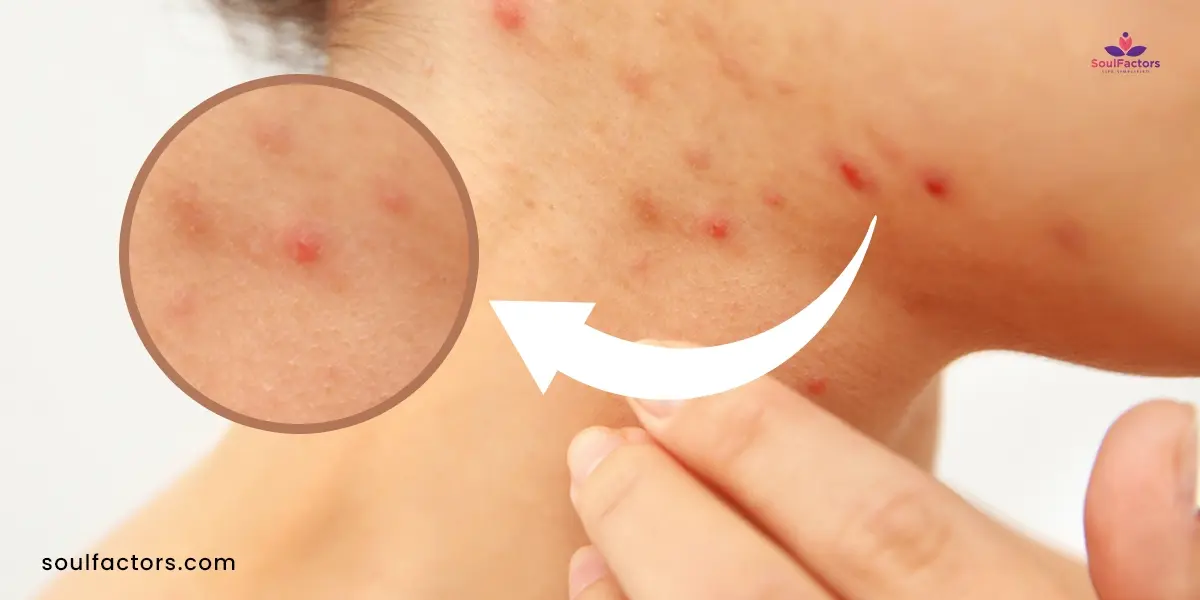
The neck is often overlooked in skincare routines. It is important to note that the skin on the neck possesses a similar level of sensitivity as the skin on the face. In the event that an individual experiences acne in their facial region, it is plausible for such manifestations to extend to the neck area. It is crucial to allocate equal attention to both the face and neck throughout one’s regular skincare routine.
Neck Acne occurs when oil and dead skin block the pores of the neck, causing bacteria to grow like it does in the face’s pores. Acne on the neck usually shows up on the front or back of the neck. This type of acne is equally irritating and discomforting compared to other forms.
What Is Neck Acne?
Acne is a prevalent phenomenon commonly observed in the United States daily. Many individuals experience it at a specific juncture in their lifespans. Possible causes of acne on the neck include infections and hormonal impacts. However, Neck Acne is most commonly caused by a lack of attention to skincare and hygiene around the neck.
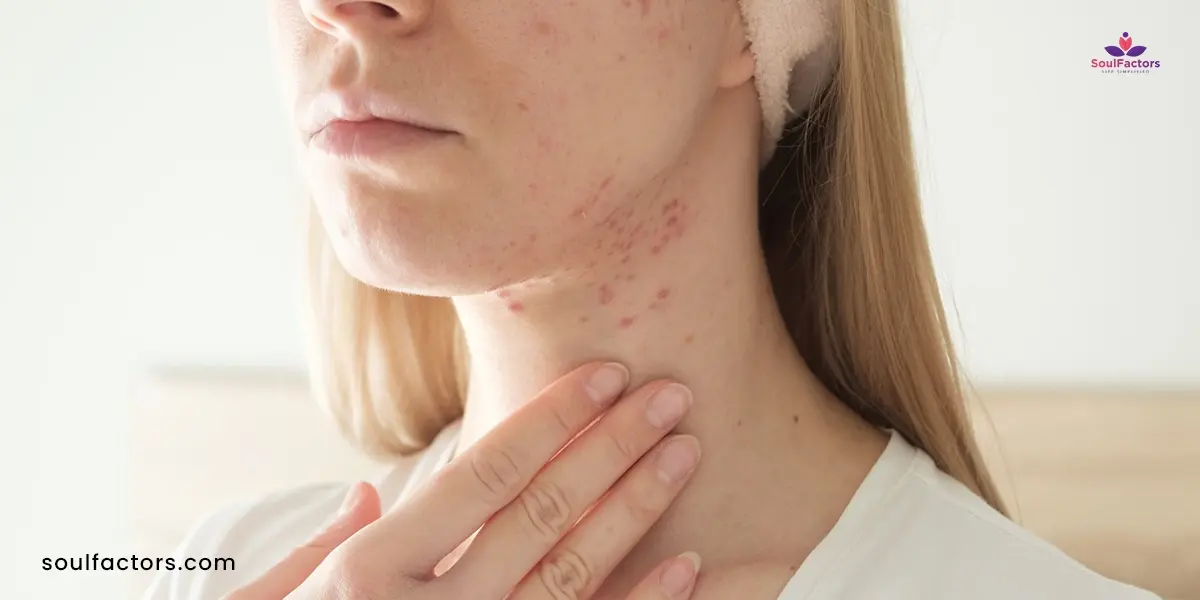
With over-the-counter (OTC) medications or home cures, minor acne breakouts on the neck typically go away within a few days. It is advisable to seek medical consultation in the event of persistent and severe acne on the neck, lasting beyond a few weeks or exhibiting resistance to initial treatment measures.
Now that Neck Acne is a global epidemic, you’re probably wondering how to clear up your skin and stop future breakouts of pimples. To curb this situation, read with me to the end.
What Causes Neck Acne?
If you’ve ever experienced acne on your neck, don’t worry as many people have been here before you and gotten out safely. Acne commonly manifests on the neck, particularly in the anterior and posterior regions. The etiology of neck acne encompasses various factors, with inadequate hygiene practices in the neck region emerging as the predominant factor.
Poor personal hygiene:
The neck is home to many sebaceous glands and pores. When oil, dead skin, and bacteria irritate hair follicles, the result is blocked pores. Acne thrives on oily skin, so the neck is a prime spot for the condition. Therefore, everyone must realize that the neck is a vital body part that requires special attention during skincare routines. Neck Acne occurs when oil and dead skin cells accumulate on the neck due to improper hygiene. If that is the case with you, the benefits of body exfoliation will surprise you.
However, you may question, Why are pimples showing up on my neck? If you have diligently maintained your neck’s health. Aside from improper hygiene, other possible causes of Neck Acne include:
Disturbed hormone levels:
The jawline, lower face, and neck are common locations for hormonal acne. Hormones commonly cause cystic acne, which causes painful, swollen zits.
Hormonal acne can be triggered by many periods of significant hormonal fluctuations, such as puberty, menstruation, menopause, and the introduction of an intrauterine device (IUD).
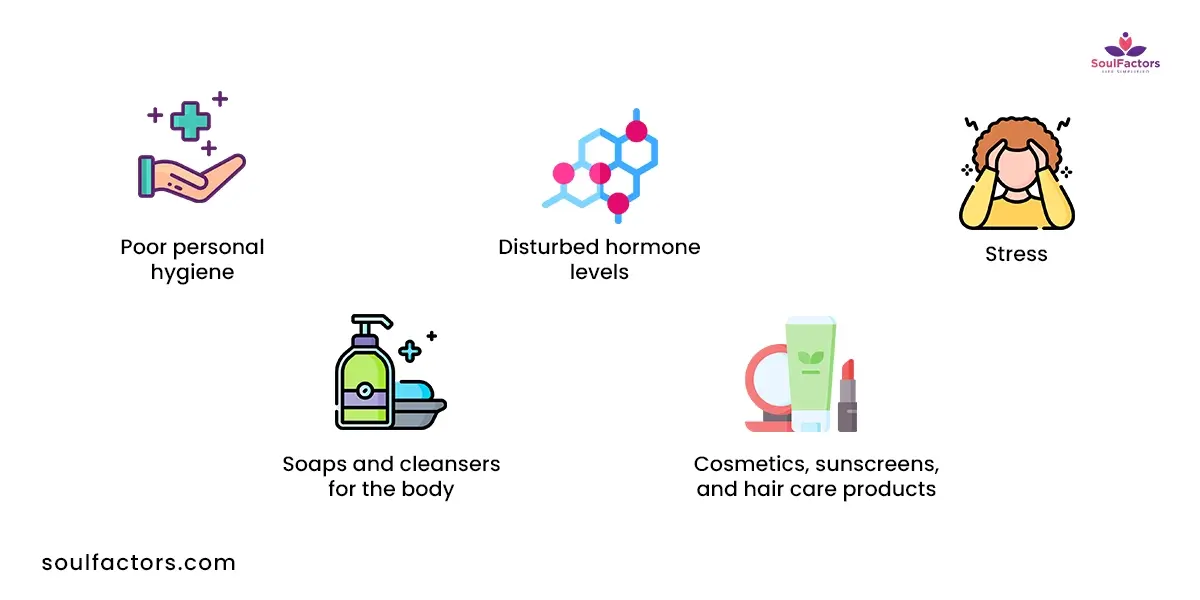
Stress:
There is a positive link observed between elevated concentrations of the stress hormone cortisol in the circulatory system and augmented sebum secretion. Possible consequences encompass the emergence of inflammatory responses, proliferation of bacteria responsible for acne, and obstruction of skin pores. During periods of overwhelming stress, individuals often neglect their self-care practices, including skincare routines.
Soaps and cleansers for the body:
As evidenced by various body wash solutions, the removal of the skin’s inherent oils prompts an increase in sebum production by the body. It is advisable to procure cosmetic products that incorporate chemical components capable of effectively eliminating dirt and oil from the facial region, while simultaneously facilitating the dilation of pores.
Cosmetics, sunscreens, and hair care products:
This is one of the most common Neck acne causes in females. The practice of removing makeup, sunscreen, and hair products before going to bed is essential, as these things include components that might potentially clog pores and hair follicles.
Neck acne is fortunate in that it can be treated in the same way that facial acne can. However, the skin on the neck is thinner than the skin on the face. Therefore, extra care and gentleness are required when applying skincare products there.
Types Of Neck Acne
Acne on the neck, like acne anywhere else, comes in various forms. Comedonal lesions like black and whiteheads are less prevalent than inflammatory lesions like papules, pustules, and cystic acne, but a combination can appear everywhere. It is important to differentiate and treat fungal acne accordingly. The most known categories of neck acne are as follows:
Pustules:
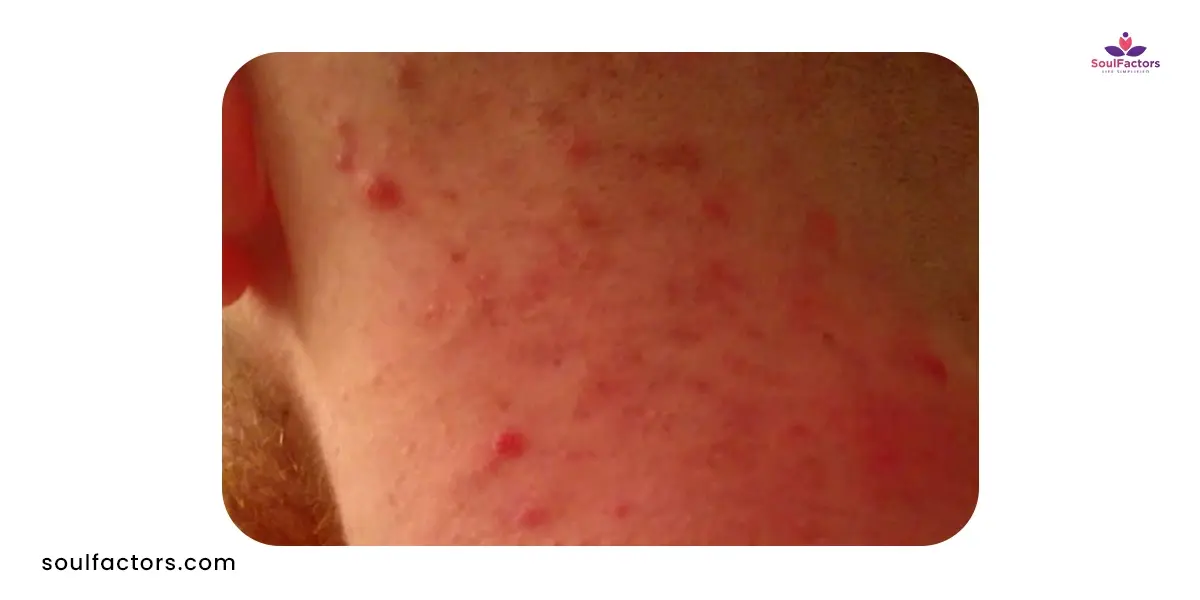
These lumps are typically red, painful, and pus-filled (1).
Papules:
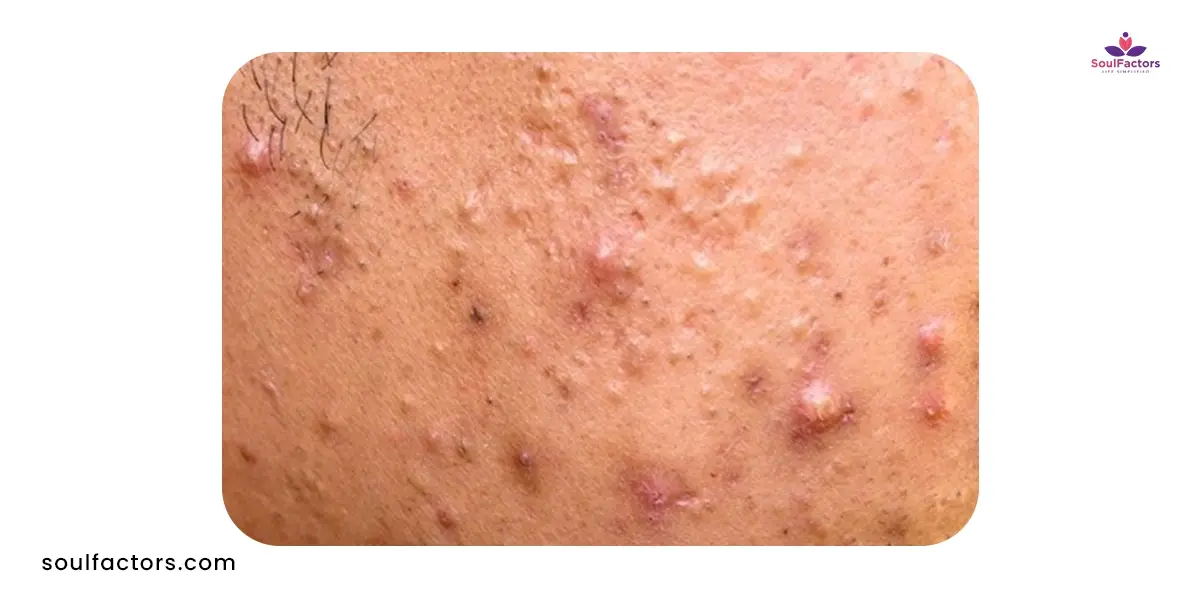
These solid skin elevations cluster around the hairline and the neck, resembling a rash. Using hair products regularly might cause skin irritation and blemishes.
Nodules:
These are Subcutaneous lesions that grow from deep within the body. Most nodules are incredibly uncomfortable and may necessitate medical attention. Over-the-counter drugs and home therapies might not work.
Acne Cystic:
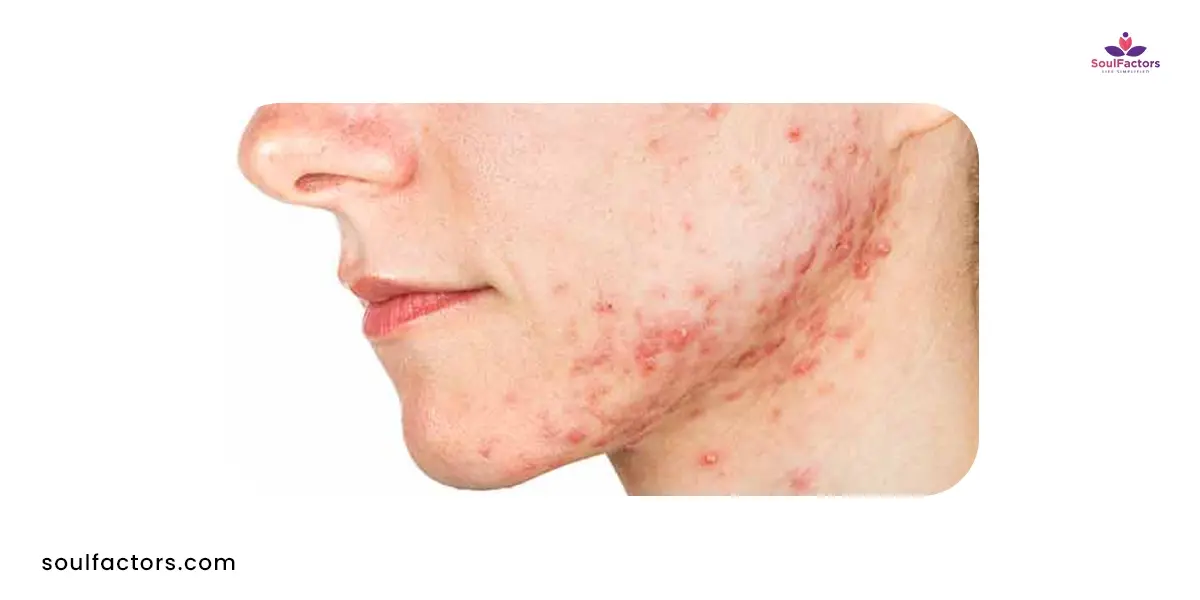
Cystic acne is the most severe, and it can be challenging to get rid of, even with professional help. These cysts develop subcutaneously and irritate the skin’s nerve endings. Hormonal abnormalities might cause this kind of pimples. They are common for women to experience during pregnancy and menstruation.
Ingrown hairs and razor bumps:
Both of these conditions, which look like zits, are frequent on the neck, especially among women experiencing hormonal acne. Since they are more inflammatory and occur more profoundly in the skin, these pimples hurt more than black and whiteheads.
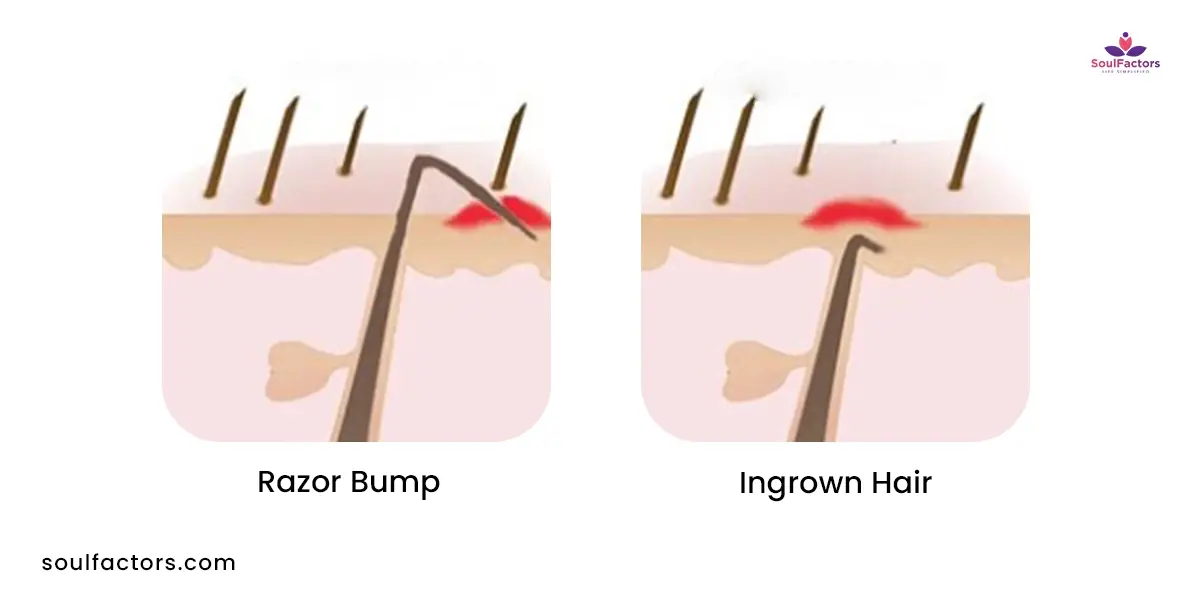
A dermatologist should be consulted before any medicine is taken to determine the cause of your Neck Acne and the best course of therapy.
Remember that pimples on the neck can appear and disappear depending on what’s causing them. However, some adults suffer from acne far beyond their adult years. However, it can be treated if diagnosed properly. Here are the most viable ways to treat Neck Acne at home and under supervision.
How To Get Rid Of Neck Acne?
Acne on the neck is common and can be prevented with proper hygiene and other lifestyle measures. Many pimples on the neck will disappear independently or respond to home treatments. People will also need to continue using acne medications or home remedies to prevent them from returning once the symptoms have gone away. Let’s start by focusing on some effective home remedies.
A. How To Treat Neck Acne At Home?
Home cures for acne on the neck are effective. The same hygiene practices that aid in healing acne on the back of the neck will also aid in treating forehead acne and acne in any other location. The following are some acne-fighting home remedies:
- Do a gentle twice-daily washing with soap and warm water.
- Using a warm compress or cloth on the affected area for 10 to 15 minutes many times a day can help bring debris trapped in a pore to the surface.
- Please don’t touch, pick, or itch the pimples or the skin around it.
- Avoid exposing the pimples to the elements (especially direct sunlight, wind, and moisture).
- Taking precautions, such as loosening fasteners on clothing or removing tight padding from sporting equipment, can help relieve pressure on a blemish.
- Until the pimples have healed, avoid shaving the surrounding area.
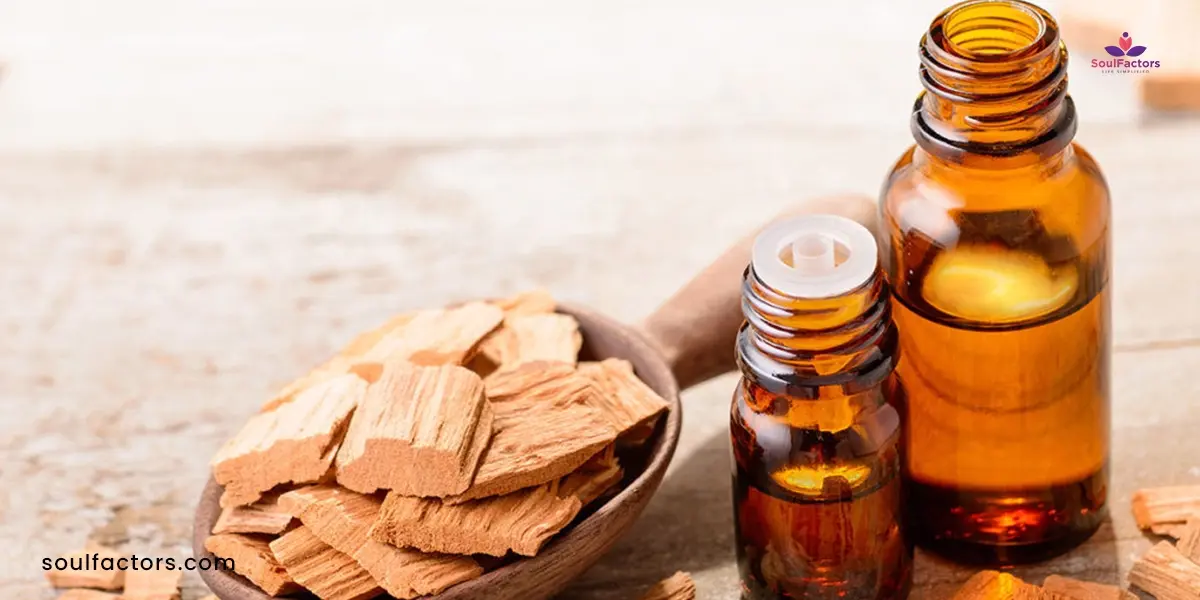
But if that doesn’t help, herbal medicines are designed to treat mild acne that can kill bacteria and reduce inflammation. Many people report success using the following essential oils:
- Rosehip oil
- Tea tree oil
- Lavender oil
- Sandalwood oil
- Evening primrose oil
Over-the -counter Options
There are also many over-the-counter (OTC) choices for treating mild acne. Acne treatments sold over-the-counter (OTC) and by prescription (Rx) often have the same active ingredients but in much smaller concentrations. Acne washes, toners, creams, and gels sold in drugstores generally contain concentrations of:
- Salicylic acid: It serves as an anti-inflammatory and skin-refining acid. Those with neck acne can opt for facewashes containing salicylic acid.
- Benzoyl peroxide: an antiseptic that also removes excess grease.
- Glycolic acid: lactic acid and other alpha hydroxy acids.
- Retinoids: like adapalene, for instance. Retinol for acne is commonly recommended.
- Niacinamide: a compound known for its anti-inflammatory effects.
- Sulfur: an antibacterial element.
Try the following to get the most out of your over-the-counter medicines:
Always put a thin layer of the acne medicine on both the spot with acne and the skin around it. Some acne drugs have ingredients that can stain or change the color of most fabrics, wood, and other surfaces. So, it is essential to wash hands well after using them.
If that doesn’t work, you should see a doctor.
B. How To Treat Neck Acne
If acne on one’s neck has the following features, medical attention is recommended:
- Have a duration of more than six weeks.
- Consist of or be palpable as firm bumps beneath the skin.
- Exude a lot of pus or blood.
- Self-care or over-the-counter drugs cannot heal it.
- Appear to recover, only to reappear shortly afterward.
- Painful.
- Severe.
- Results in mental anguish.
When acne can’t be cleared with over-the-counter or doctor-prescribed skin treatments, they may suggest taking drugs that work throughout the body. In cases of severe or long-lasting nodular or cystic acne, doctors or dermatologists may suggest the following treatments, taking into account things like the patient’s age, gender, and general physical health:
- Oral antibiotics.
- Medication to regulate hormone levels.
- Use of isotretinoin (2).
Treatment options for severe or persistent “neck acne” also include:
- Microdermabrasion.
- Surgical removal of acne.
- Phototherapy.
- A chemical peel.
- Treatment with laser therapy.
With one of all these medications, be rest assured of clearing acne on the back of the neck.
What The Connection Between Neck Acne And PCOS
Menstrual cycles are either irregular or extremely lengthy in women with polycystic ovarian syndrome (PCOS). An excess of the male hormone androgen is a common consequence. The ovaries are home to several tiny fluid sacs, and thus, they may have trouble with regular ovulation.
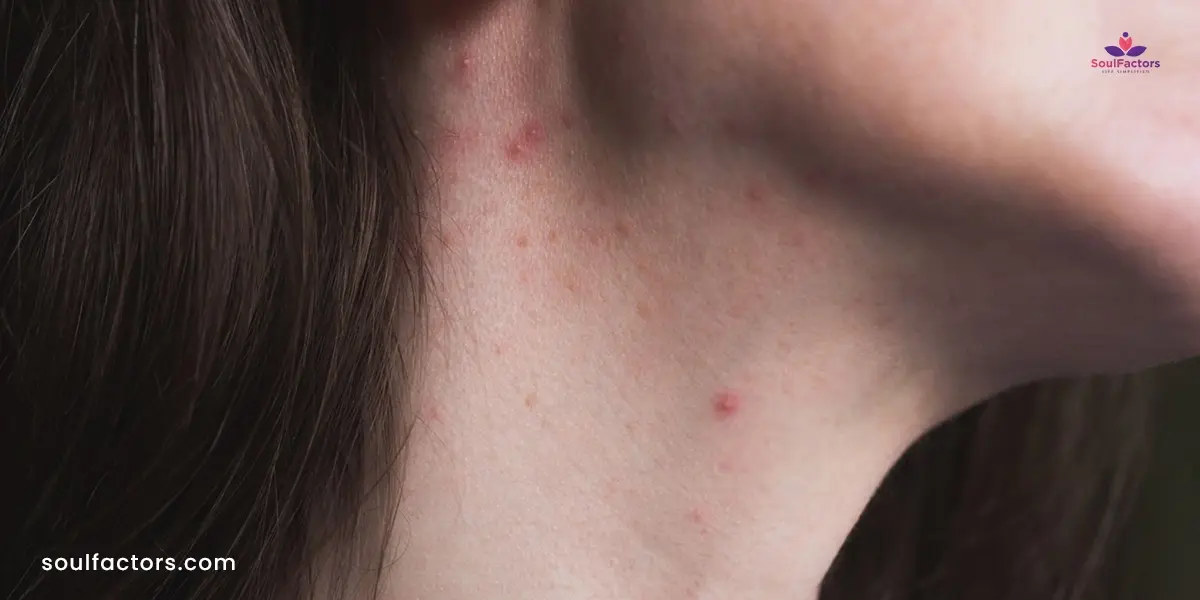
Acne caused by polycystic ovary syndrome affects hormonal sensitive areas, such as the face and upper neck. The increased androgen in the ovaries is linked to acne as it triggers oil production in the skin (3). Due to this syndrome, acne mostly appears on the face, back, neck, and chest. Because of this, PCOS can be one of the Neck acne causes in females. Therefore, many women have hormonal acne on the neck. Treating PCOS acne by targeting the hormonal imbalance is ideal.
How To Prevent Neck Acne?
The following advice will help you avoid getting Neck Acne:
- Use lukewarm water and fragrance-free, hypoallergenic soap to wash your neck regularly. Look out for bodywashes specifically formulated for acne.
- The neck needs a good cleanse after a strenuous workout or heavy perspiration session.
- Wash one’s clothes and change into a new set when one becomes sweaty and filthy.
- Wash any neck contact or neck-pressure-inducing sporting equipment.
- Shave with soap and be careful when doing so.
- Apply oil-free, comedogen-free (pore-unclogging) skin care products.
- Select cosmetics without artificial colors, flavors, fragrances, or preservatives (such as parabens).
- Use an antibacterial cleanser to clean your makeup brushes frequently.
- Wear chemical-free cotton garments to avoid skin irritation.
- Utilize hypoallergenic detergent and avoid fabric softeners and dryer sheets to keep sensitive skin from irritation.
- Bed items like blankets and pillows should be washed monthly (or biweekly if the weather is warm), while sheets should be washed weekly.
- Use neck jewelry that does not include any allergens, such as metals, plastics, or even certain plants.
- Modify the length of straps on a bag or backpack so they don’t chafe or cause discomfort around the neck.
Conclusion
The presence of acne on the neck region might cause significant discomfort. Nevertheless, there is no cause for undue concern, as this issue is an often-encountered phenomenon that proper management may effectively resolve. The occurrence of acne is attributed to the proliferation of bacteria resulting from the blockage of neck pores by sweat, grease, and grime. A thorough and gentle cleansing followed by applying warm compresses is considered the most straightforward approach for treating the condition commonly known as acne on the back of the neck.
Nevertheless, if neck acne persists beyond a few weeks, it is advisable to consider employing alternative, efficacious, over-the-counter remedies. If it fails to heal, it is advisable to seek the expertise of a dermatologist for a thorough evaluation and subsequent prescription of appropriate medicine. However, asserting that prevention is superior to treatment is more accurate. It is advisable to consistently incorporate skincare procedures on the neck area to have a smooth and radiant complexion.

Subscribe to Newsletter
Elevate your routine, stay on trend, and embrace a personalized beauty journey with our curated insights.

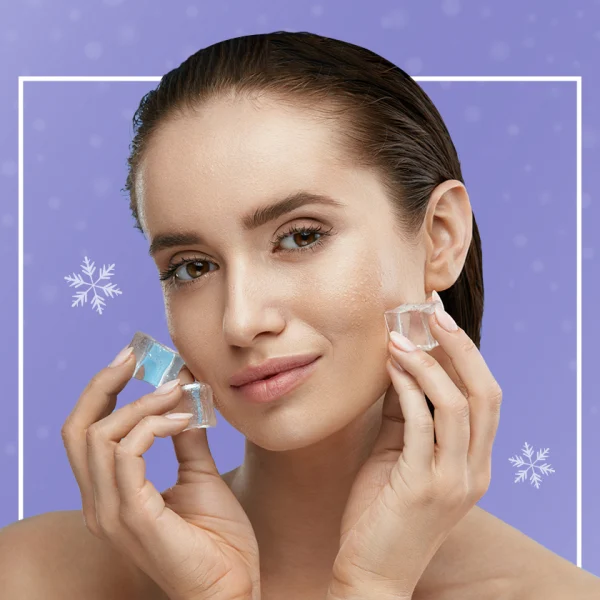
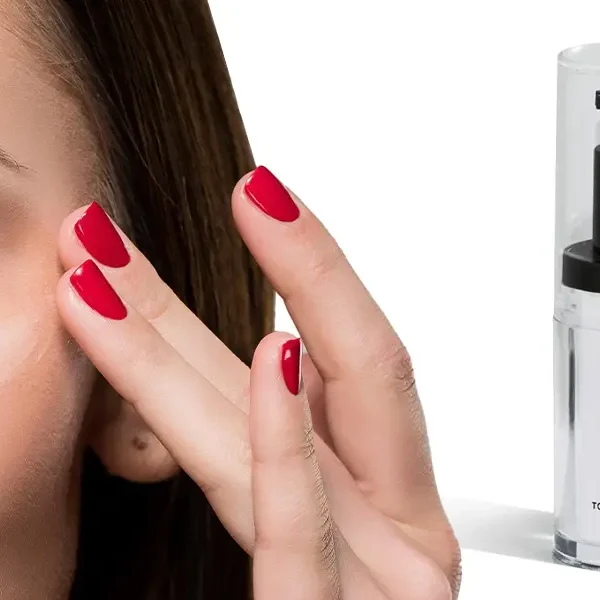

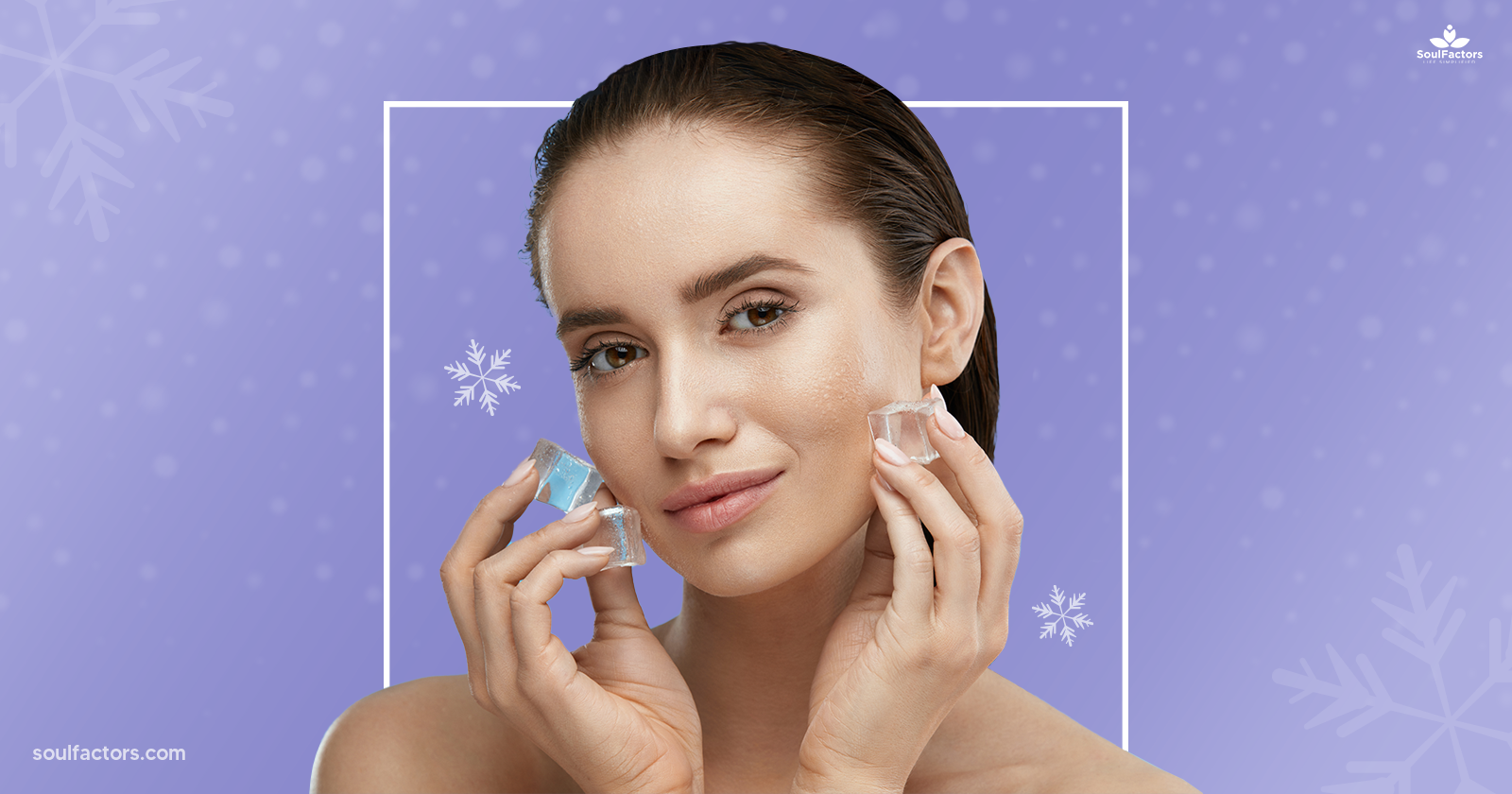
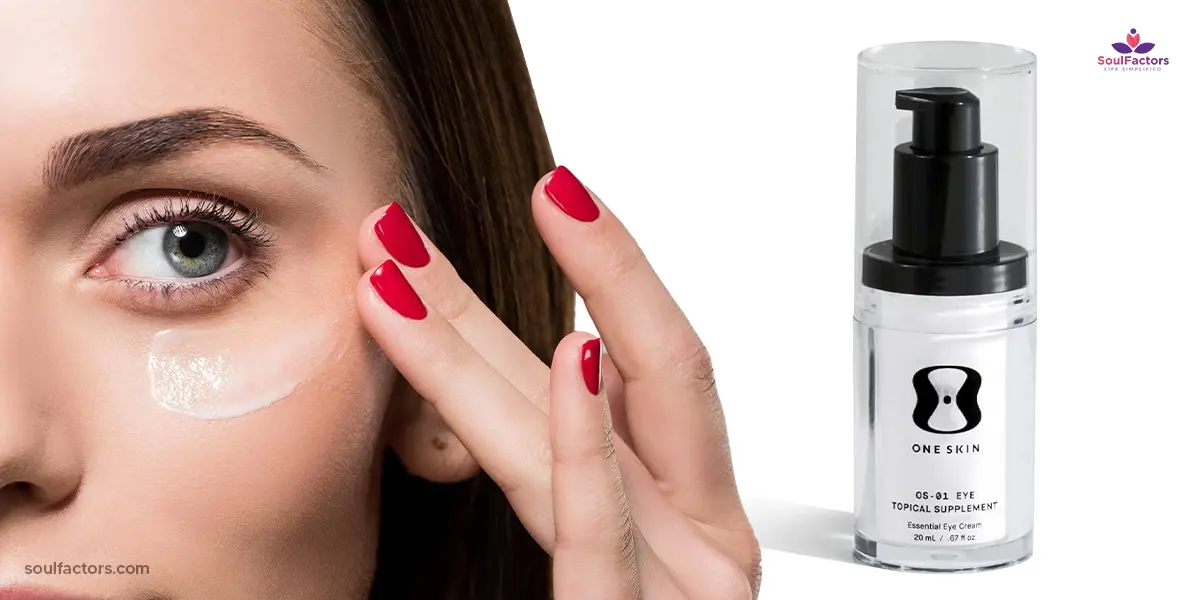
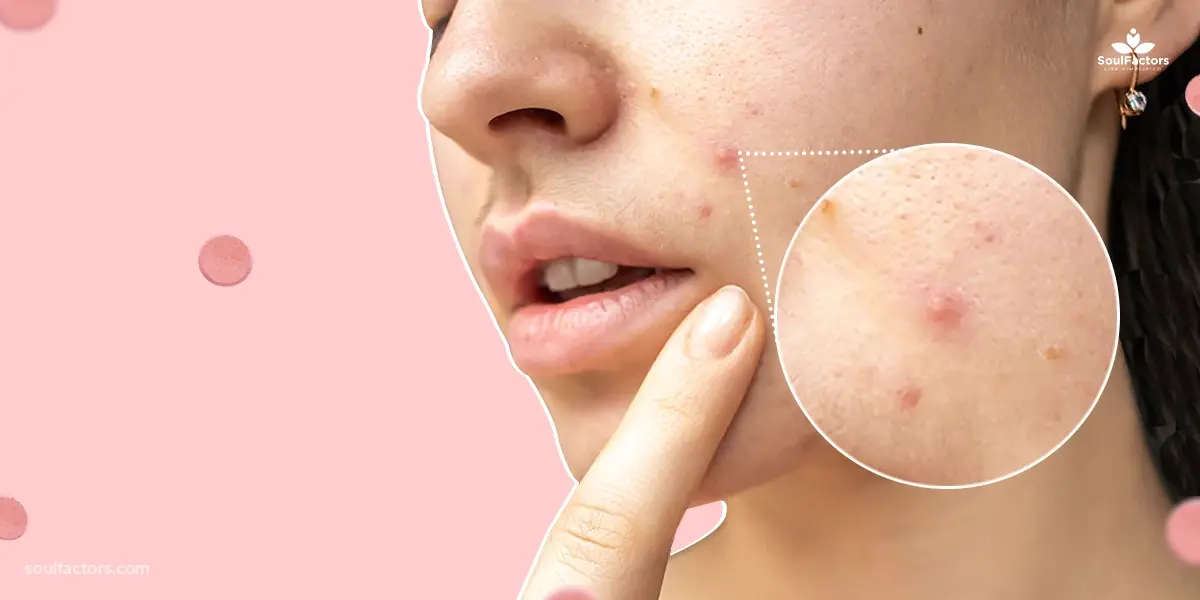
Write a Comment